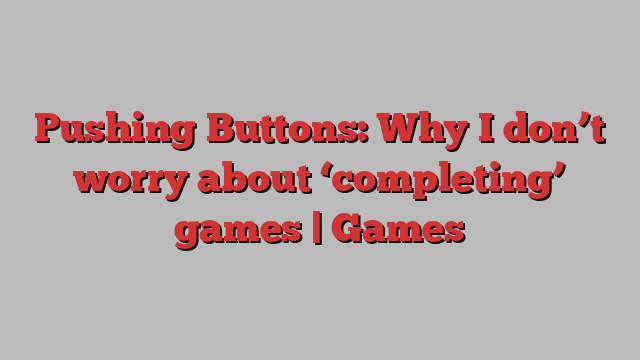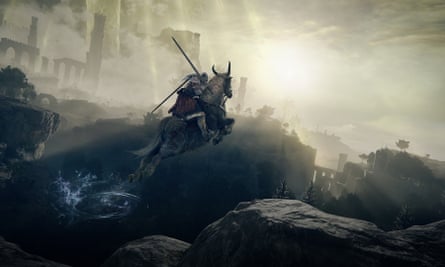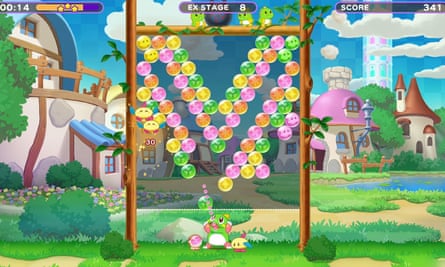
When the reviews for Legend of Zelda: Tears of the Kingdom went online earlier this month, I started to panic. Almost every critical reaction seemed to contain the same sentence: “I’ve been playing for 60 hours yet I’ve barely scratched the surface”. Like Breath of the Wild before it, the latest title in Nintendo’s role-playing adventure seriesis a vast odyssey with an intricate narrative constructed from dozens of quests, supported by a fully functioning world. Like many other gamers my age, I thought to myself, that would have been great when I was 25, but I’ll get an hour a day on this thing at most. Is it all too much?
About 10 hours into the main campaign – which, as ever, revolves around a quest to track down the eponymous royal but somehow also manages to be mind-numbingly complex, like Middlemarch with monsters – something important happened: I let go. Without a deadline to finish it (thanks Keza, for taking on the review), I could just enjoy it in my own way. For several years, I’ve been writing about how experiences such as Fortnite and Minecraft are no longer games to play but places to be (hang out with friends, build some stuff, whatever), and I was finally able to apply this sense of freedom to a big role-playing game. I decided I was never going to finish Tears of the Kingdom, and that was such an immense relief. Now I could have fun.
In truth, the contract between game designers and game players – where the latter did exactly what the former set out – began to break down as soon as the modern open world genre took hold the late 1990s. Formative titles such as Shenmue, Driver and Grand Theft Auto provided players with weird stuff to discover in the environment, and by doing so they gave players the agency to create their own fun. But it’s interesting how hard they worked to keep you playing the main campaign. The language of player agency is intrinsically belittling – “mini” task, “side” quest – while inventory and progress management screens insistently prod you toward the story goals, and non-player characters provide synthetic urgency by yelling, “Quickly, follow me or the world will end!”, while you search through rubbish bins for ammo and lore drops. There’s such a weird tension between freedom and the didactic nature of the linear narrative. It’s so invigorating not to give into it.
Since getting into Elden Ring last year, I’ve started to look at my time in epic games as leisure time. All it takes is that one intellectual leap: this isn’t a game I have to finish, it’s a place I want to explore, and it’s mine. In 2004, my old friend Kieron Gillen – now an astonishingly successful comic book scribe but once a writer at PC Gamer – penned a sort of manifesto on New Games Journalism . He argued that in the era of open games, critics had to function more like travel writers, giving readers a sense of a place, rather than a glorified product review. Twenty years later, I now realise players have to make the same leap.

Tears of the Kingdom, as far as I’m concerned, is a location. A destination. A place to explore – like Tokyo or Machu Picchu or the Norfolk Broads. I can head south from Lookout Landing and wander the roads through the Passeri Greenbelt down to Mount Daphnes, chatting to travellers coming the other way. Or I can strike north on horseback, vaguely aiming for the Great Hyrule Forest, but often getting lost along the way. Maybe I’ll visit a couple of shrines, or help someone gather fruit, maybe not. There’s a famous quote about the difference between travellers and tourists: the latter go to see attractions they know are there, the former go to discover what they don’t know at all. Playing games as a traveller is emancipating. The overriding narrative becomes a mere tourist booklet, a Rough Guide to Hyrule – the plot is a suggestion, that’s all, and maybe not even the best suggestion for you. The best thing for you to do in Hyrule might be to build rocket carts and drive them down hillsides. You’re not wasting time, you’re making memories. No fun time is ever wasted time.
Narrative in interactive entertainment can be thrilling and compelling, but it can also be autocratic. How oppressive and insistent I find the endless cut-scenes in the Assassin’s Creed games. Both Elden Ring (pictured above) and Tears of the Kingdom largely tell their stories in subtle shades, in whispers of lore and knowledge. You can listen, like eavesdropping on other guests in the hotel bar, or you can smile and go about your way.
So don’t worry about “completing” Tears of the Kingdom. I mean, do you worry about “completing” Rome? I hope not. Because when/if you visit the Eternal City, much more valuable than what tourist guides tell you to see are the memories you make yourself: the little trattoria where the staff were nice to you, the shade across a backstreet, liquorice ice-cream on the steps of a fountain in Quartiere Coppedè. It is in those moments that a city lives. It’s the same with an open world game of such scope and quality as Tears. Throw the guide book in the river and run in the opposite direction. Who knows what you’ll find.
What to play

The only video game my wife ever enjoyed was Bust-A-Move 2 on the original PlayStation, a weirdly named sequel to the classic bubble popper, Puzzle Bobble from Taito (and yes, bubble popper is a legit genre name). Anyway, Taito has just released a new addition to the series, Puzzle Bobble Everybubble!, on Switch and it is delightful.
As ever, you fire your cannon at coloured bubbles to create chains and pop them, thereby clearing the screen. Sounds simple, but – like Tetris – it’s horribly compelling once you start. Plus, the luscious pastel pink colours, dainty audio and ultra cute characters make it the audiovisual equivalent of binging a whole bucket of pick ‘n’ mix. I might even get my wife to resurrect her gaming career.
Available on: Nintendo Switch
Approximate playtime: 20+ hours
What to click
PlayStation Showcase: Spider-Man 2 leads PS5’s 2023 games lineup
Half of British female gamers experience abuse when playing online
System Shock review – you versus a murderous AI in revived sci-fi horror classic
after newsletter promotion
The Lord of the Rings: Gollum review – boil it, mash it, stick it in the bin
No more ‘I took an arrow to the knee’: could AI write super-intelligent video game characters?
What to read

-
Corporate consolidation is certainly in the air at the moment. Now CD Projekt Red has had to deny rumours that Sony is looking to buy it. The developer of the Witcher series and Cyberpunk 2077 (above) says it wants to remain independent. Of course, being completely obsessed with the final Succession series, I’m inevitably thinking, “Hmm, that would be a great negotiation tactic.”
-
If you have a deep interest in the idea of game worlds as places of exploration rather than “play”, MIT Press has a fascinating book on the subject: Wandering Games by Melissa Kagen. It’s an academic look at the way game worlds function, from Death Stranding to The Last of Us Part II. I learned a lot from it.
-
I love the booming subculture around building and engineering in Tears of the Kingdom. Polygon has a nice look at the scene here, including a functional wooden helicopter.
-
If end-of-level bosses fought each other, who would win? This is the question modders have been asking by getting From Software monsters to do mortal combat. This is a typically fascinating game culture piece from Eurogamer.
Question Block

No question, but some suggestions this week. Reader Chris emailed in some further picks for turn-based-tactics fan Dan from a few issues ago, and they’re too good not to share:
If you have a question for Question Block, just hit reply or email [email protected] to send it in. Here at Pushing Buttons, we apply ourselves with equal rigour to both serious and silly questions.